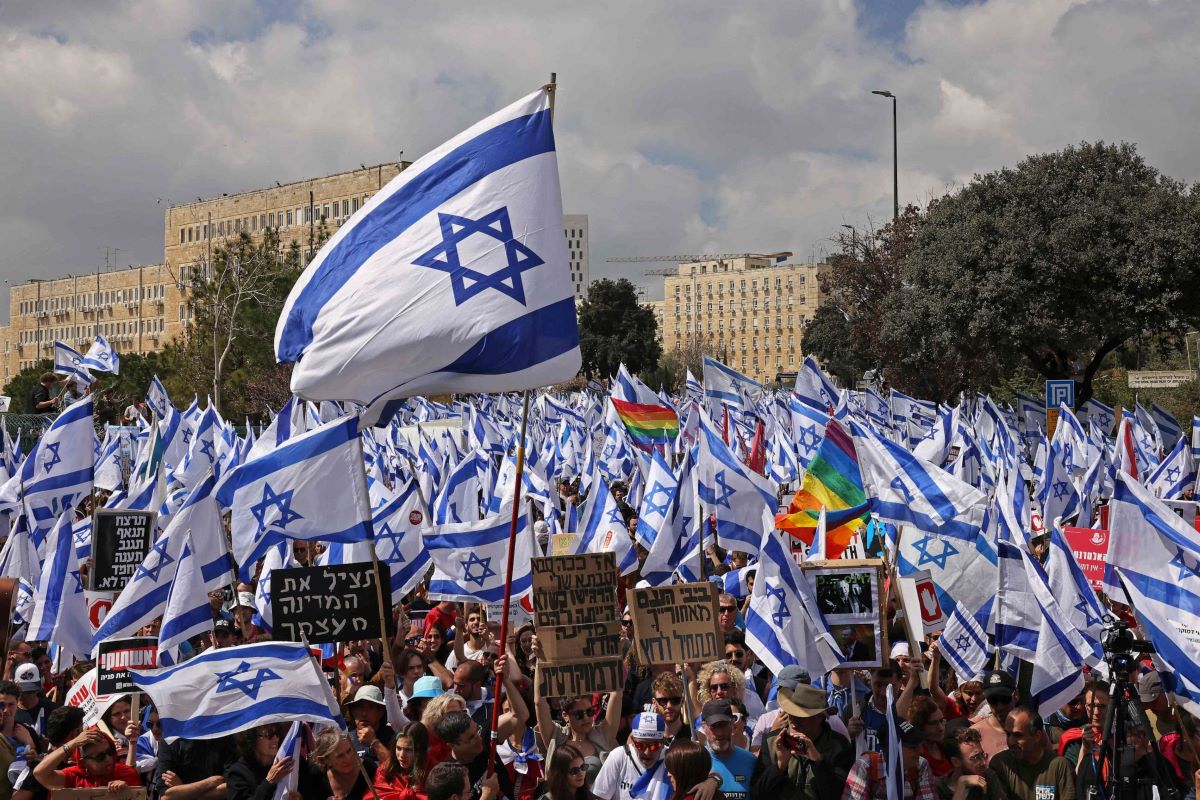On Tuesday, tens of thousands of demonstrators flooded the streets of Israel, marking the largest weekday protest in months against the government’s renewed efforts to overhaul the country’s judicial system.
Protesters caused significant disruptions, snarling traffic in Tel Aviv, creating chaos at Ben Gurion Airport, marching at the Supreme Court in Jerusalem, and lining Mediterranean beaches for what they termed a day of “disruption and resistance.”
Photos and videos shared by protest organizers and Israel Police depicted crowds in cities across the country, including Haifa, Petach Tikva, Beer Sheva, and Hod Hasharon.
By 6:30 p.m. local time (11:30 a.m. ET), at least 71 people had been arrested, with 45 of them already released, according to a statement from Israel Police.
On Monday, lawmakers voted to remove the Supreme Court’s authority to deem government actions “unreasonable,” marking the first of three votes needed for the controversial bill to become law.
This bill is part of a broader package of judicial reforms aimed at weakening the judiciary. Prime Minister Benjamin Netanyahu and his allies describe these measures as “reforms” necessary to rebalance power among the courts, legislators, and the government.
Critics argue that the reforms threaten to transform Israel into a dictatorship by removing the judiciary’s significant check on government actions.
Protests against these plans have been ongoing throughout the year. Netanyahu paused the legislative process in March following an unprecedented general strike that significantly disrupted Israel’s economy. The vote on Monday signals the end of that pause.
A substantial protest unfolded across Israel on Tuesday, continuing a series of demonstrations against the judicial overhaul that has persisted for months and significantly impacted daily life in the country.
Organizers claimed they had blocked Tel Aviv’s Ayalon Highway, a major thoroughfare, asserting that the police could not clear it due to the large number of protesters.
In Haifa, northern Israel, a photographer from the Israeli newspaper Haaretz was pushed to the ground during a morning demonstration before being escorted away by police, as shown in video footage.
The video captures the photographer identifying himself as a Haaretz employee. Haaretz later tweeted that the photographer was beaten by police, detained, and released shortly after.
Protesters around the photographer chanted “Shame,” a common refrain at anti-overhaul protests, as he was removed. According to Israel Police, the photographer had blocked a road, acted disruptively, and had pushed police officers, leading to his detention.
The police statement noted that he was “shouting and causing a disturbance” and was pushed toward the sidewalk. The use of force was deemed necessary to remove him from the scene, but he was released immediately afterward.

In March, Netanyahu was compelled to suspend his contentious plans to overhaul Israel’s judiciary in response to widespread strikes, protests, and international pressure.
This delay followed an unprecedented general strike that paralyzed transportation, universities, restaurants, and retail operations. Netanyahu also faced rare criticism from key allies, including the United States.
Despite the pause, Netanyahu did not abandon the agenda but deferred it to a future Knesset session. The controversial effort has now resumed, reigniting public anger.
On Monday night, the Knesset voted to advance the bill that removes the Supreme Court’s authority to declare government decisions unreasonable—the first of three required votes for the bill to become law.
The second and third votes are scheduled for July 24. If approved, this would be the first part of the overhaul to become law.
The judicial overhaul comprises a series of bills that would, in essence, grant the Israeli parliament, the Knesset, and the ruling parties increased control over Israel’s judiciary.
The proposed changes would fundamentally alter how judges are selected and what laws the Supreme Court can review, representing a historic shift in Israel’s judicial system.
Last month, Netanyahu announced that the most contentious part of his proposal—a provision allowing the Knesset to overturn Supreme Court rulings—had been dropped and would not be reintroduced.
However, the package still includes several controversial elements, such as altering the composition of the committee that selects judges to give the current government more control, removing independent legal advisers from government ministries, and stripping the Supreme Court of the power to declare government decisions “unreasonable.”
Israel lacks a written constitution, relying instead on quasi-constitutional basic laws and the Supreme Court as the only check on the Knesset’s power.
Netanyahu and his supporters argue that the Supreme Court has become an elitist body disconnected from the Israeli people, overstepping its role by adjudicating issues beyond its scope.
Critics contend that Netanyahu is advancing the overhaul to benefit his own ongoing corruption trial, which involves charges of fraud, bribery, and breach of trust—a claim he denies.
They argue that the overhaul, if fully implemented, would dismantle the sole mechanism available for checks and balances against the legislative branch.
Netanyahu has defended the reforms, asserting in an April interview that the goal is to restore a balance typical in most democracies without eliminating checks and balances on the majority’s power.







Leave a Reply